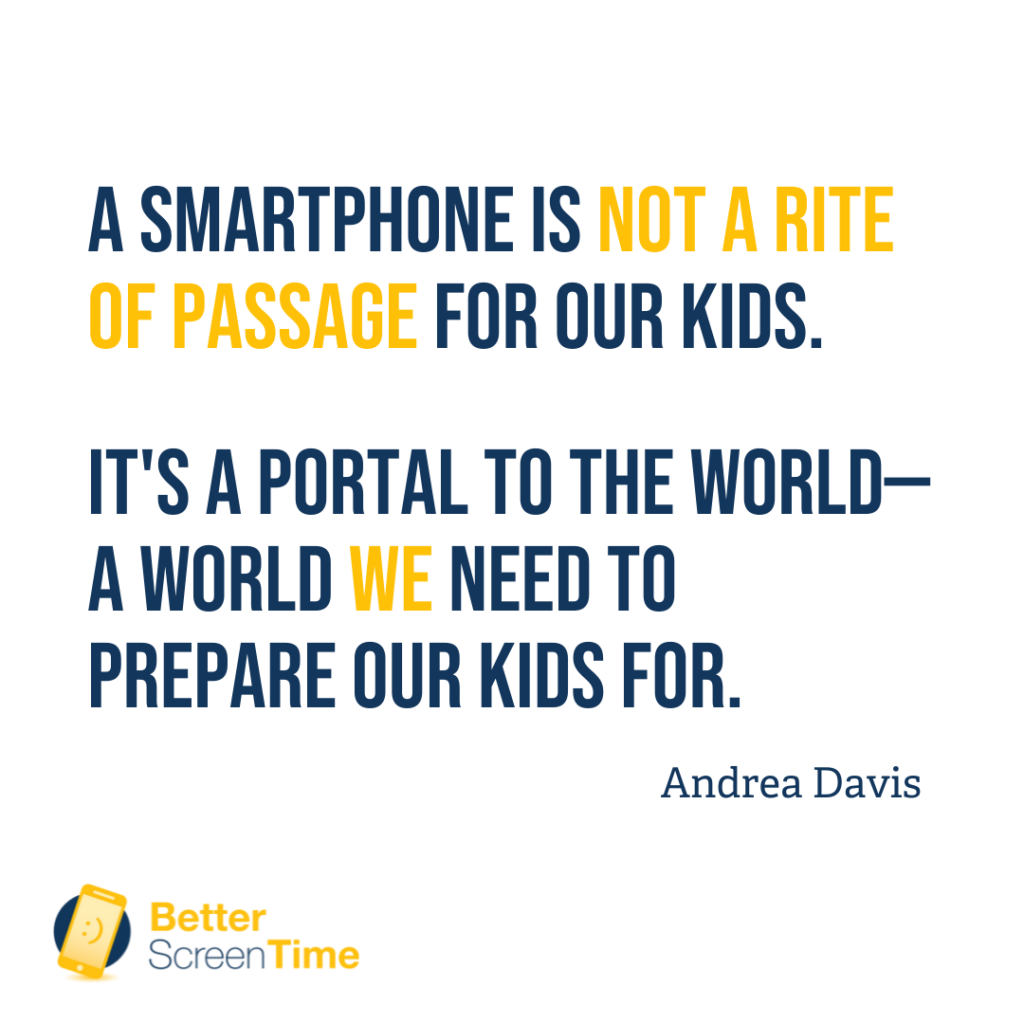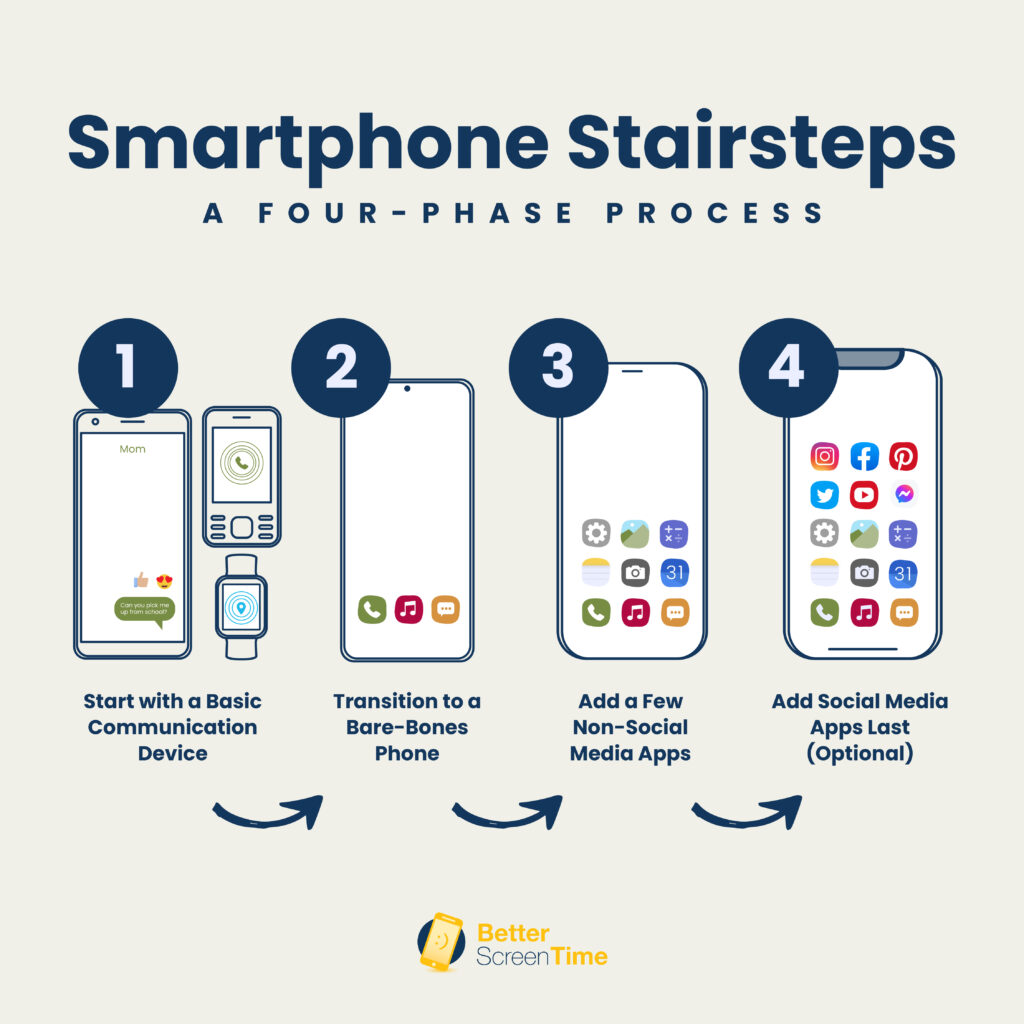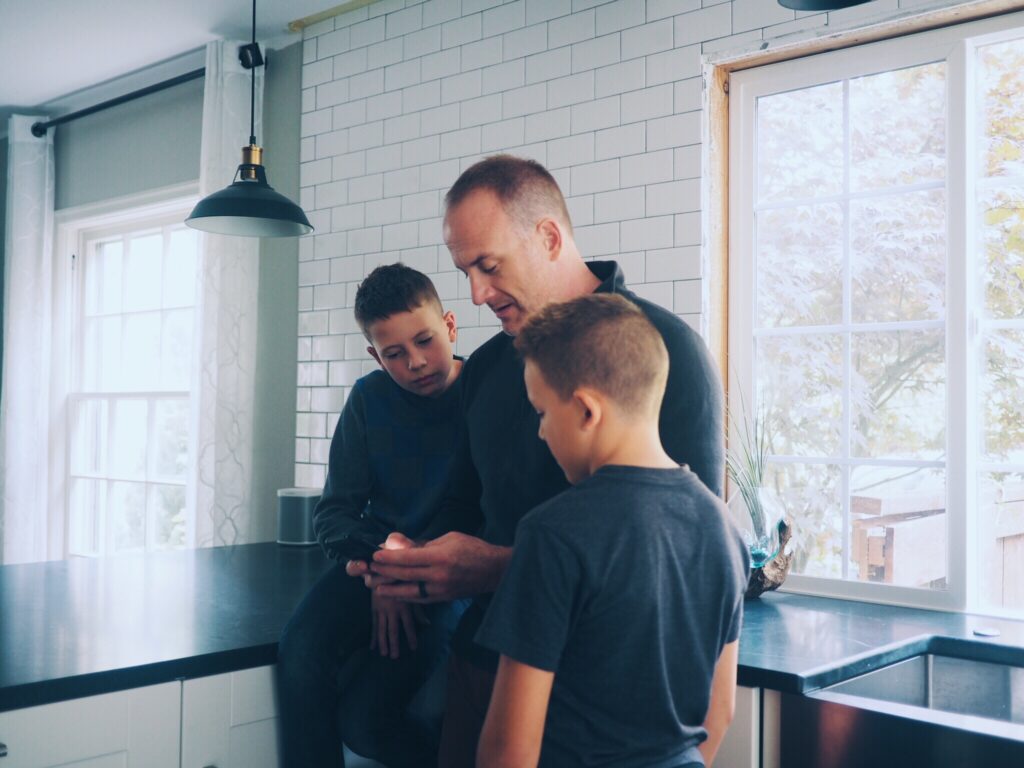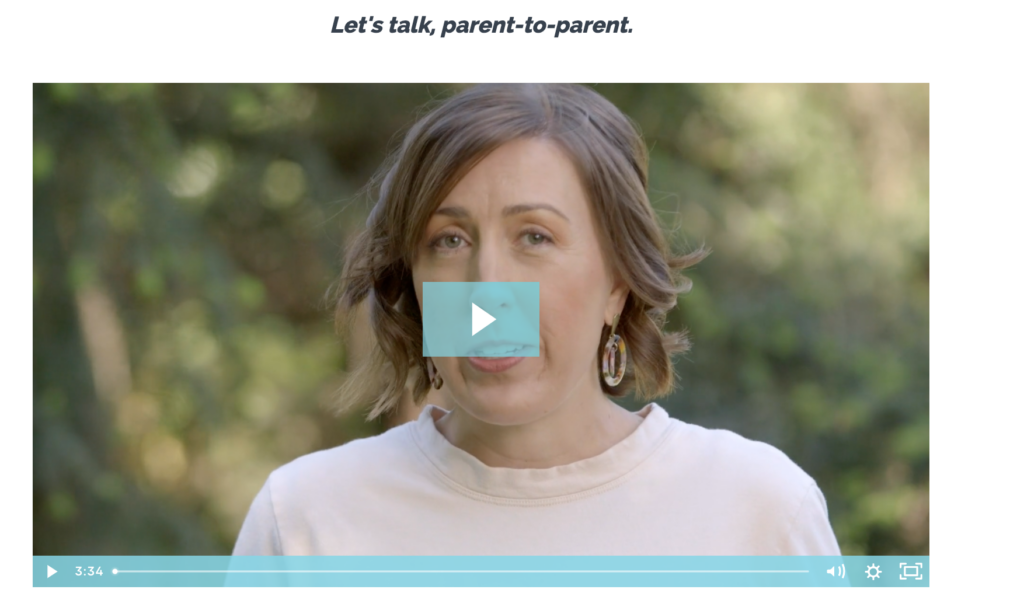In 2017, during a crazy cross-country move, my husband Tyler and I, handed over an abandoned smartphone to our middle schooler. We wanted her to be able to stay in touch with old friends and to make sure she knew where to get off the bus to our temporary housing in a new town, which was buried in six feet of snow.
It didn’t take long to realize we’d made a mistake. This wasn’t just a phone—it was a portal to the world, a world we hadn’t prepared our daughter for. It was too much, too soon.

Tyler and I agonized over that decision and how to move forward. We talked to our daughter, admitted our shortsightedness, and replaced the smartphone with an archaic (but totally usable!) brick phone. It was painful for everyone, but it was a decision we’ve never regretted.
At that time, we promised my daughter that we would commit to doing a better job of preparing ourselves as parents and her, for this huge responsibility.
Parent & Family Preparation Come First
I began calling old friends, scouring the internet, and reading books such as Glow Kids, Reset Your Child’s Brain, and The Tech-Wise Family. How could we delay and be intentional with how we introduced phones in the future?
As the parents of five, I knew each child wouldn’t be ready for this responsibility at the same time. I also knew, based on my research and experience, that smartphones weren’t meant for kids. This was a privilege to prepare for—akin to getting a driver’s license.
We started by preparing our family as a whole. We gathered our kids for a family tech discussions, and asked our kids two questions:
- What does it mean to be responsible?
- What does it mean to be emotionally mature?
Our kids came up with a great list of characteristics and we turned their responses into a self-evaluation for device readiness that we still use, and that has since been downloaded by thousands of parents. You’ll find that self-evaluation here.
Also, after much thought, I scribbled out this four-phase process for introducing a phone in 2018, and we’ve since named it Smartphone Stairsteps.

We use our self-evaluation for cell phones, plus our self-evaluation for parents and teens for social media as we move through this process—slowly.Years later, parents now have safer phone options! We use kid-safe phones with our current middle schoolers and it’s made a huge difference in baby-stepping into tech. You can check out our kid-safe phone reviews and experiences here.
Why We Don’t Use a Cell Phone Contract
As I was talking to parents and looking for solutions on how to handle cell phones with a teen I kept running into cell phone contracts. They often contained pages and pages of do’s and don’ts, asking a child or teen to sign in order to have a phone.
It just didn’t feel like the right approach for us. Why?
As a former Jr. High teacher, I knew a few things about adolescents:
- The adolescent brain is still under construction. The prefrontal cortex, the part of the brain responsible for decision making, won’t be fully developed until their mid-20’s. Teens can’t be expected to always make smart decisions on smartphones.
- The teen brain is no match for persuasive design. After reading Adam Alter’s book, Irresistible: The Rise of Addictive Technology and the Business of Keeping Us Hooked, I knew that the adolescent brain was no match for such powerful technology. (Our adult brains often struggle!)
- Teens are still learning. Many contracts start with the sentences, “I will never” or “I promise..” those are some pretty-heavy demands of someone who is still figuring life out. How can we ask a teen to NEVER break a single rule on a list of 50 things? Could you have done that when you were a teen? Yes, our teens can make decisions ahead of time about things they will never do (I did this as a teen), but there are bound to be mistakes and lessons learned.
- Teens lie to protect themselves and/or their parents from feeling disappointed. Did you know that many teens don’t tell their parents about being cyberbullied because of the fear that their phone will get taken away? While we can’t completely control this circumstance, we can lay the foundation by giving our relationship more power than the phone.

I asked Tyler his thoughts on cell phone contracts, expressing that many parents were using them, but wanting his opinion. As a mechanical and software engineer, he understands what technology is. His opinion mirrored mine, but he brought up other vital points:
- Teens have no buy-in with a contract—just limitations. They will sign it so they can have their phone but will have little motivation to follow the contract.
- Contracts pit teens against parents. They create a situation where parents are the providers, and teens are the users. Collaboration between parents and teens is much more effective in the long run—helping teens and parents learn to self-reflect and put themselves in the driver’s seat of a device.
- A smart teen is only a click away from getting around parental controls and filters. Teaching the skill of discernment and distinguishing between good and bad can’t be outlined in a contract. The internal filter is built as teens mature and grow.
Are Cell Phone Contracts Bad?
No, cell phone contracts aren’t bad, but I think they are an outdated solution for the challenges teens are facing online today.
We’ve rushed smartphones into the hands of children, asking them to do the impossible. Giving a phone contract to an untrained 12-year-old and asking them to sign it is like giving them keys to the car and making them sign a contract promising not to crash the car.
Cell phone contracts also give parents a false sense of security. “Whew! The paper is signed. Our teen knows what they can and can’t do. Now we can move on with our lives.” WRONG. We can’t rely on a piece of paper to safeguard our kids from digital dangers.
It’s time for a new approach—a slower and proactive approach—to smartphones and our kids. Then when the time is right to introduce a phone, we need to do more than just have our teens sign on a dotted line.Teens today need much more than a signed contract to help them combat cyberbullying, sexting, sextortion, dangerous online challenges, pornography, online predators, the harms of social media, and endless gaming and video streaming.
What’s Better Than a Cell Phone Contract?
- One-on-One Mentoring—We work with our teens one-on-one using our Better Screen Time High Five:
- Connect—spend quality time together, understand your teen’s world, and identify their needs.
- Model—be the change you want to see with your own device.
- Teach—explore the research together-read books, watch TED Talks, and bring a speaker to your community or school to talk about the harms of technology.
- Talk—talk about hard things and listen more than you talk.
- Love—be a safe place to land and do your best to not panic.
- Collaboration—As we mentor our teens, we also collaborate with them through:
- Values discussions
- Tech boundaries
- A Parent-Teen Pledge

Preparation is a Personalized Process
Rather than using Google and printing out a pre-made cell phone contract, we recommend a personalized approach:
- Create a family tech plan with your entire family. I share how our family did this for the first time in 2018 here. Use our FREE QUICK GUIDE to take action and create your family tech plan this week!
If you want to teach your kids about digital dangers and do more than make a plan, our discussion guide, Creating a Tech-Healthy Family, on Amazon is a fabulous resource to help you get started.
For even more hand-holding, research, support, and ideas, our course—Creating a Tech-Healthy Family—offers live calls, community interaction, a private podcast, and video tutorials.
Your family tech plan will help you, the parent, be accountable! Yes, the first step to having a tech-healthy teen is being a tech-healthy parent. There are some boundaries that everyone in the family needs to commit to—things like all phones are plugged into the charging station by 9 p.m. or dinner time is conversation time (no devices at the table). Your family can decide what those boundaries should be.
Your family tech plan and discussions are the foundation of healthy tech habits for your teen. These boundaries eventually become routines and patterns as kids grow, making it much, much easier to keep the tech in check when they are teenagers.
- Delay and commit to a slow-tech approach. Start with a kid-safe family phone, rather than a personal device. This is a shared device that doesn’t belong to your child. When they’ve demonstrated maturity and responsibility with a family device, then they can move onto a personal device, but utilize kid-safe smartphones and say “No” to social media in the beginning.
- Start mentoring your teen one-on-one. Parents can take turns to reduce the workload. Look at the research with your teen and talk about all the sticky stuff. Create tech boundaries together, and regularly and openly do a tech audit on any device your teen uses.
- Identify key values together. Help your teen to identify their values and to pinpoint what really matters to them. This will help them to build the internal filter as they make choices on a device. Did you know that when we live a life that is congruent with our values, we feel better about ourselves? Teens need this now more than ever.
- Write a parent-teen pledge. First, take some time to write down your commitment to your teen. For example, how will you react when they do something they weren’t supposed to? How will you model healthy tech use and take time to connect with your teen? Next, invite your teen write out how they plan to live their values—both offline and online. (They can even use bullet points!) This doesn’t have to be complicated, but the process of articulating their commitment does two things:
- It plants the pledge in their minds first. Because they came up with it, they’ll be more likely to feel an inner resolve to live it.
- Study after study confirms that we remember things better when we write them down. Through the process of writing, your teen’s brain will be more likely to decide that their values are something worth remembering.
- It plants the pledge in their minds first. Because they came up with it, they’ll be more likely to feel an inner resolve to live it.
If your teen is old enough and responsible enough for a smartphone, they should be mature enough to articulate how they will use or not use their phone. A pledge still gives you the opportunity to get ideas on paper, and having expectations in writing helps! (I think this is why a cell phone contract is so appealing.) But keep it short, and have your teen put it in their own words. This will “stick” in the brain for much longer than a long list of rules in a contract.

If you are thinking, “my teen would never sit down and have this conversation.” I would challenge you to consider if your teen is truly ready for the responsibility of owning a device?
If a pre-teen or teen cannot vocalize what they will do or not do with a phone, they aren’t ready for one. Our teens must be able to have calm conversations about tech boundaries before they are allowed to have a cell phone.
Then, when your teen finds a way to download Snapchat without your permission or spends hours texting instead of doing their homework, you can both return to your pledge. You can ask, “Is this in line with what you committed to do? Why or why not?” You can then make a plan, together, about how to move forward.
We share more guidance on how to create a parent-teen pledge in our course, Untangling Teens & Tech. This isn’t something that you just sit down and do—it’s a process…
Are You Ready To Mentor Your Teen?
Our teens need us. Teens are spending up to nine hours a day on screens and social media is taking over being social in real life. As a result, we are facing a national youth mental health crisis, a crisis that isn’t going away anytime soon.
Tech is here to stay and it is our job to teach our teens how to use it well using our life experience and their tech experience. We can take a Team Approach to Technology™.
If you’re ready to mentor, not just monitor your teen, but you’re not sure where to start, our course, Untangling Teens & Tech will walk you through the process step-by-step.
It’s time to toss out the cell phone contract and pledge to show up for our teens!

